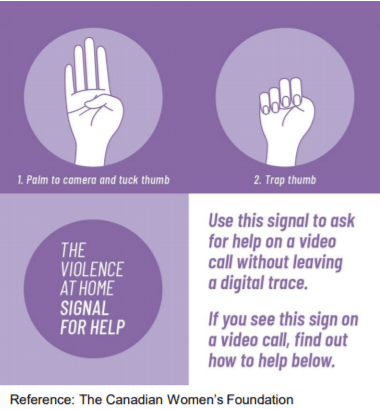
Safety planning for individuals exposed to violence during the pandemic
 by Keiko Kataoka – May 7, 2020
by Keiko Kataoka – May 7, 2020 Content warning: The content of this article includes discussion of sexual and intimate partner violence and may trigger uncomfortable feelings. Should you need to, please connect with supports like Hope 24/7 at 1-800-810-0180 or SAVIS of Halton at 905-875-1555 or call 911 for emergency assistance.
Recent government consultations have revealed an alarming 20 to 30 per cent increase in domestic violence rates in certain regions during the COVID-19 pandemic. [i] Agencies that work directly with survivors suspect the rates are in fact much higher, as there may not be the opportunity or means for people to report violence when isolated at home.
Sheridan is acutely aware of the issues that marginalized and equity-seeking groups may be experiencing during the pandemic and how they are disproportionately impacted. To raise awareness around these issues and discuss how to address them, Sheridan’s Inclusive Communities team has launched a series of webinars.
Its third installment, “Addressing Vulnerabilities: Safety Planning for Individuals Exposed to Sexual Violence and Intimate Partner Violence During the COVID-19 Pandemic,” included speakers Lianne Kendall, Sexual Violence Response Specialist in the Centre for Equity and Inclusion at Sheridan, Ola Rzeszutek, Crisis Support Worker and Human Trafficking Specialist at SAVIS, Andrea Beebe, Public Education Coordinator at SAVIS and Lisa McDonald, Crisis Therapist and Prevention/Outreach Worker at Hope 24/7.
Below are some takeaways from the webinar.
Why are survivors at increased risk during the pandemic?
- With physical distancing measures in place, survivors may be spending more time in the home, in isolation with an abuser
- Places of work, study, worship, wellness, etc. that survivors would have been able to access as a safe space or reprieve from abuse may not be accessible
- Supports and resources that were previously offered by social agencies may have shifted in their modes of delivery or be suspended altogether
- Survivors may be reluctant to access shelters or family members’ homes due to concerns around the virus
- Survivors may have their means of communication limited by an abuser and therefore cannot access support, healthcare or maintain positive connections with peers, colleagues, friends and family
- Survivors don’t have as much time alone or privacy to seek help. An abuser may be monitoring phone calls, texting, Internet use
- Abusers may be withholding things like money, access to personal protective equipment or identification and preventing a survivor from leaving the home safely
- Stress exacerbated by the pandemic may trigger violent behaviours by abusers
Safety planning and accessing support during the pandemic
What is a safety plan? The Canadian Women’s Foundation outlines its importance and what it entails on its website.
- Survivors will need to be creative in finding privacy to work on a safety plan (e.g. in the washroom, when out on a walk, grocery shopping, etc.). Try to focus on reliable resources like a friend, family member, colleague or sexual assault
 crisis service and have their contact information readily available
crisis service and have their contact information readily available - If a safety plan was established before the pandemic, reassess it to ensure that the same supports are still in place given current pandemic restrictions
- If there’s an opportunity to communicate with a trusted person virtually and you’re in distress, use one frog emoji sign to indicate a check-in is needed or two frog emojis if 911 needs to be called. Similarly, if you’re on a video call with someone you trust and need to signal for help, use the hand gesture in this graphic
- Call 911 for emergency support or Hope 24/7 at 1-800-810-0180 or SAVIS of Halton at 905-875-1555 for crisis support
- Members of the Sheridan community seeking resources and non-emergency support can email svrs@sheridancollege.ca
A framework of empowerment: How can you support yourself?
- Work on a safety plan (see above)
- Practice grounding techniques to keep mentally and emotionally strong such as:
- Deep breathing exercises
- Meditating on two words like “I can” or “in and out” while breathing
- Focusing on five items in a room and tap into your five senses to focus on what they look like, what they smell like, what they feel like, etc.
- Taking five minute moments of reprieve in a safe space like a washroom – run water through your hands, take deep breaths
- If possible, stay connected to loved ones, neighbours, colleagues, friends to maintain important social connections
- Focus on things you can control to maintain emotional integrity during challenging times
A framework of empowerment: How can you support a loved one?
- Use a trauma-informed approach
- Do not feel that you need to have all the answers when supporting a survivor. Connect with Hope 24/7 or SAVIS for expert guidance
- Listen – if someone is disclosing violence for the first time, reinforce how courageous it is to share that information and that you’re privileged to receive it. Do not try to be the hero in the situation, try to give power back to the survivor
- If you know someone at risk, make efforts to check in with them regularly and ask, “what can I do for you?”
- Ask close-ended questions that can be answered with “yes” or “no” when you suspect distress – e.g. “do I need to call 911?”
Additional Resources
- Sheridan Resource: What can you do?
- Sexual Violence Resources
- Resources on Gender-Based Violence and the COVID-19 Pandemic
- The Learning Network: Intimate Partner Violence in a Pandemic: COVID-19 – Related Controlling Behaviours
- The Learning Network: 3 Considerations for Supporting Women Experiencing Intimate Partner Violence During the COVID-19 Pandemic
- SAVIS social media channesl – “Let’s Talk Tuesdays” live session at 3 p.m. on Instagram and other support groups.
- Instagram: @savisofhalton
- Facebook: Sexual Assault and Violence Intervention Services of Halton (SAVIS)
- Twitter: @SAVISofhalton
[i] https://www.cbc.ca/news/politics/domestic-violence-rates-rising-due-to-covid19-1.5545851
Story written by: Keiko Kataoka, Manager, Communications and Public Relations at Sheridan.
Media Contact
For media inquiries, contact Sheridan’s Communications and Public Relations team.





